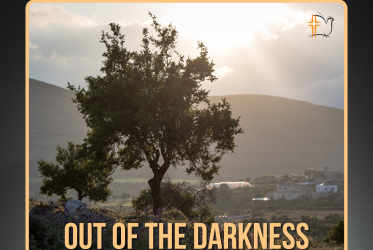By Claus Grue*
In spite of a seemingly bleak outlook for a solution to the conflict in Palestine and Israel, religious leaders all over the world persist in their advocacy for justice and peace in the Holy Land. That became evident at the WCC peace consultations in Beit Sahour this summer, where 60 leaders and representatives from Christian churches and faith-based organizations around the world gathered to manifest their support for a peaceful end to the occupation of Palestinian territories.
A well-known figure in the ecumenical movement, who took part in the consultations and who has pledged his entire life to pursue human rights, is the Norwegian priest Rev. Eilert Lund Rostrup.
His belief in the creation of God and the resurrection of Jesus Christ is not only spiritual but also a question of justice and dignity: “We are here on earth as part of God’s creation, where we are all equal in the eyes of God. We are here to serve one another and to stand in solidarity with people that daily struggle for life, dignity and justice – individually and collectively”, Rostrup explains.
His engagement started in his teens with a fast-growing involvement in the national YWCA/YMCA-movement, which – after ordination and five years of priesthood – eventually led to a position as its international secretary in Norway.
“That became a platform for my ecumenical and political engagement, which had grown even stronger during a visit in apartheid South Africa in 1987”, he explains.
After numerous trips to the Holy Land over the years, he sees parallels between the previous situation in South Africa and the situation in Israel and Palestine, where one ethnic group is deprived of fundamental human rights.
“This is such a sad and unjust situation. We must continue to raise awareness in our own contexts in Europe and elsewhere about it. Despite the lack of political progress towards just peace we must continue to share the resistance and hope with our Palestinian sisters and brothers. The hope of resurrection is fundamental in our Christian faith and peoples who believe in resurrection can never be held down. And for me to live the hope is also to act on the situation, including financial measures to non-violently stop the illegal occupation of Palestinian land”, Rostrup says.
He regards the WCC and its ecumenical platform as critical to mobilize engagement for justice and peace on a global scale, where all Christian churches can participate in practical and concrete solidarity.
“Open and honest discussions are crucial, also on difficult issues like economic measures to stop the occupation. The recent peace consultations in Beit Sahour, where the National Coalition of Christian Organizations in Palestine presented its open letter, are an excellent example of that”, explains Rostrup.
A firm commitment to the ecumenical movement has been central throughout his professional career and international engagement seems to have permeated everything he has done.
“I am a priest, but my pastoral deeds are not dependent on a pulpit and an altar”, he concludes.
Since 2007 his call is channeled through The Karibu Foundation – a Norway-based civil society organization providing economic support to faith based and secular grassroots organizations and networks in the global South that work for a just world.
After strong input in Holy Land, WCC plans to refine strategy for just peace (WCC press release of 23 June 2017)
Christian organizations in Palestine release open letter (WCC press release of 21 June 2017)
WCC Executive Committee statement on 50 Years of Occupation (11 June 2017)
*Claus Grue is a communication consultant for the World Council of Churches. The story is based on an interview done in September 2017.






